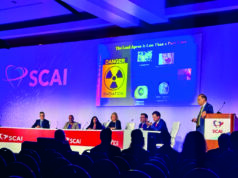
Data from a Swedish registry, which was reported at EuroPCR (21–24 May, Paris, France), showed that bivalirudin alone was associated with a similar rate of 30-day mortality to heparin alone in patients with non-ST segment elevation acute coronary syndrome (NSTE-ACS) undergoing percutaneous coronary intervention (PCI)—questioning the superiority of bivalirudin to heparin in the absence of GPIIb/IIIa blockade.
European and US NSTE-ACS guidelines currently recommend bivalirudin alone as an alternative to unfractionated heparin plus GP IIb/IIIa receptor inhibitors in patients undergoing an intended urgent or early invasive strategy.
Researchers analysed data from the Swedish coronary angiography and angioplasty registry (SCAAR) to compare the rate of 30-day mortality with heparin alone to that with bivalirudin alone in patients with NSTE-ACS undergoing PCI between 2005 and 2011. Data were available for 31,351 treated with heparin alone and for 10,186 treated with bivalirudin.
Oskar Angerås, consultant cardiolgoist at Sahlgrenska University Hospital, Gothenburg, Sweden, reported that the adjusted odds ratio for 30-day mortality favoured heparin (1.53 for complete case analysis). He said: “One should be very careful when interpreting the results; however, none of our models show that treatment with bivalirudin improves outcome. The results question the superiority of bivalirudin to heparin in the absence of GP IIb/IIIa blockade in patients with NSTE-ACS undergoing PCI. The clinical implication is that if we use heparin alone, we can be assured that it is enough. For those using bivalirudin, switching to heparin achieves similar outcomes and will reduce the cost of procedures.”
He added that a prospective, randomised trial comparing bivalirudin with heparin in this group of patients is warranted, and that that his group has started the registry-based randomised VALIDATE-SWEDEHEART trial comparing bivalirudin to heparin in patients pretreated with novel ADP-receptor blockers, with the aim of recruiting a total of 6,000 patients.
William Wijns, chairman of PCR and course director of EuroPCR, commented on the data: “This new data comparing heparin with bivalirudin in NSTE-ACS patients undergoing PCI is very interesting and we await results from new trials looking at this further.”













